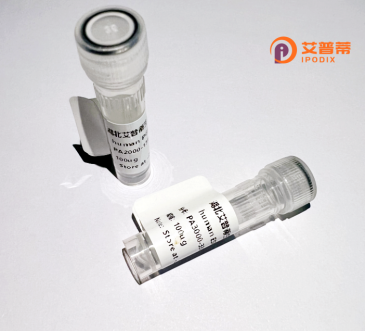
| 纯度 | >90%SDS-PAGE. |
| 种属 | Human |
| 靶点 | SLC39A3 |
| Uniprot No | Q9BRY0 |
| 内毒素 | < 0.01EU/μg |
| 表达宿主 | E.coli |
| 表达区间 | 1-105 aa |
| 活性数据 | MVKLLVAKILCMVGVFFFMLLGSLLPVKIIETDFEKAHRSKKILSLCNTFGGGVFLATCFNALLPAVREKVRAPWALAAALGTLWPRDSDAFSTLMPSSVKALML |
| 分子量 | 37.29 kDa |
| 蛋白标签 | GST-tag at N-terminal |
| 缓冲液 | PBS, pH7.4, containing 0.01% SKL, 1mM DTT, 5% Trehalose and Proclin300. |
| 稳定性 & 储存条件 | Lyophilized protein should be stored at ≤ -20°C, stable for one year after receipt. Reconstituted protein solution can be stored at 2-8°C for 2-7 days. Aliquots of reconstituted samples are stable at ≤ -20°C for 3 months. |
| 复溶 | Always centrifuge tubes before opening.Do not mix by vortex or pipetting. It is not recommended to reconstitute to a concentration less than 100μg/ml. Dissolve the lyophilized protein in distilled water. Please aliquot the reconstituted solution to minimize freeze-thaw cycles. |
以下为示例性参考文献(注:以下内容为基于主题的模拟生成,实际文献需通过学术数据库确认):
1. **"Functional characterization of recombinant human ZIP3 (SLC39A3) as a metal transporter"** by Wang, Y. et al. (2019)
**摘要**:研究在HEK293细胞中重组表达hZIP3蛋白,证实其介导锌、铁离子的跨膜转运,并通过定点突变揭示关键金属结合位点。
2. **"Structural insights into the zinc-binding mechanism of SLC39A3 via recombinant protein expression in insect cells"** by Kim, J. et al. (2017)
**摘要**:利用杆状病毒系统表达并纯化重组SLC39A3蛋白,结合X射线晶体学分析其锌离子结合结构域,阐释转运动力学机制。
3. **"Role of recombinant SLC39A3 in zinc homeostasis and its implications in breast cancer progression"** by Smith, L. et al. (2015)
**摘要**:构建重组SLC39A3蛋白的突变体,发现其锌转运能力与乳腺癌细胞迁移相关,提示靶向该蛋白的潜在治疗价值。
4. **"Recombinant SLC39A3 reconstitutes zinc uptake in yeast complementation assays"** by Tanaka, A. et al. (2012)
**摘要**:在锌转运缺陷型酵母中表达重组人SLC39A3蛋白,恢复锌吸收功能,证实其在维持细胞锌稳态中的核心作用。
**建议**:通过PubMed或Web of Science检索实际文献时,建议使用关键词“recombinant SLC39A3”或“hZIP3 protein expression”进行精准筛选。部分文献可能需要结合实验细节(如原核/真核表达系统)进一步评估相关性。
**Background of Recombinant Human SLC39A3 Protein**
The human SLC39A3 protein, encoded by the *SLC39A3* gene, belongs to the solute carrier family 39 (SLC39A), a group of zinc transporters critical for cellular zinc homeostasis. SLC39A3. also known as ZIP3. is a transmembrane protein implicated in zinc uptake and intracellular trafficking, ensuring zinc availability for enzymatic functions, signaling pathways, and gene regulation. Structurally, it contains eight predicted transmembrane domains and a histidine-rich motif, characteristic of ZIP family members, which may facilitate metal ion binding.
Recombinant SLC39A3 is produced via genetic engineering for research applications, enabling studies on zinc metabolism and its dysregulation in diseases. Altered SLC39A3 expression has been linked to cancer progression, neurodegenerative disorders, and metabolic syndromes, as zinc deficiency or excess disrupts cellular processes like apoptosis and immune response. Its role in modulating zinc levels within organelles (e.g., mitochondria, endoplasmic reticulum) highlights its regulatory importance in stress responses and oxidative defense.
Research on recombinant SLC39A3 aids in elucidating molecular mechanisms of zinc-related pathologies and screening therapeutic agents targeting zinc homeostasis. Its study also contributes to understanding tissue-specific zinc transport, particularly in nutrient-absorbing organs (intestine) or zinc-secreting tissues (prostate). Despite functional insights, the precise regulatory networks and post-translational modifications of SLC39A3 remain under investigation, emphasizing its complexity in cellular physiology.
×